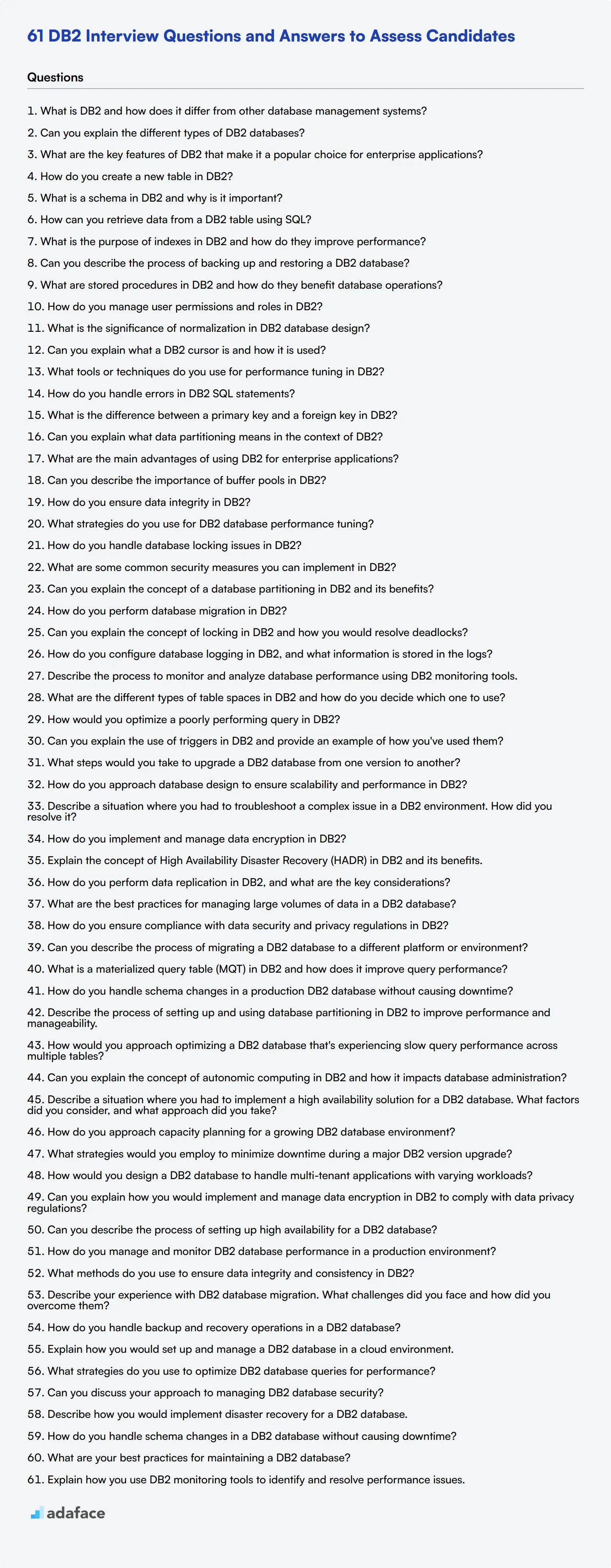Hiring the right DB2 professionals is crucial for maintaining robust database systems and ensuring optimal performance. By asking targeted interview questions, recruiters and hiring managers can effectively assess candidates' knowledge and expertise in DB2 technologies.
This blog post provides a comprehensive list of DB2 interview questions and answers, categorized by skill level and role. From basic concepts to advanced administration, we cover a wide range of topics to help you evaluate candidates thoroughly.
Using these questions will enable you to identify top DB2 talent and make informed hiring decisions. Consider complementing your interview process with a DB2 skills assessment to gain a more complete understanding of candidates' abilities.
Table of contents
16 basic DB2 interview questions and answers to assess candidates
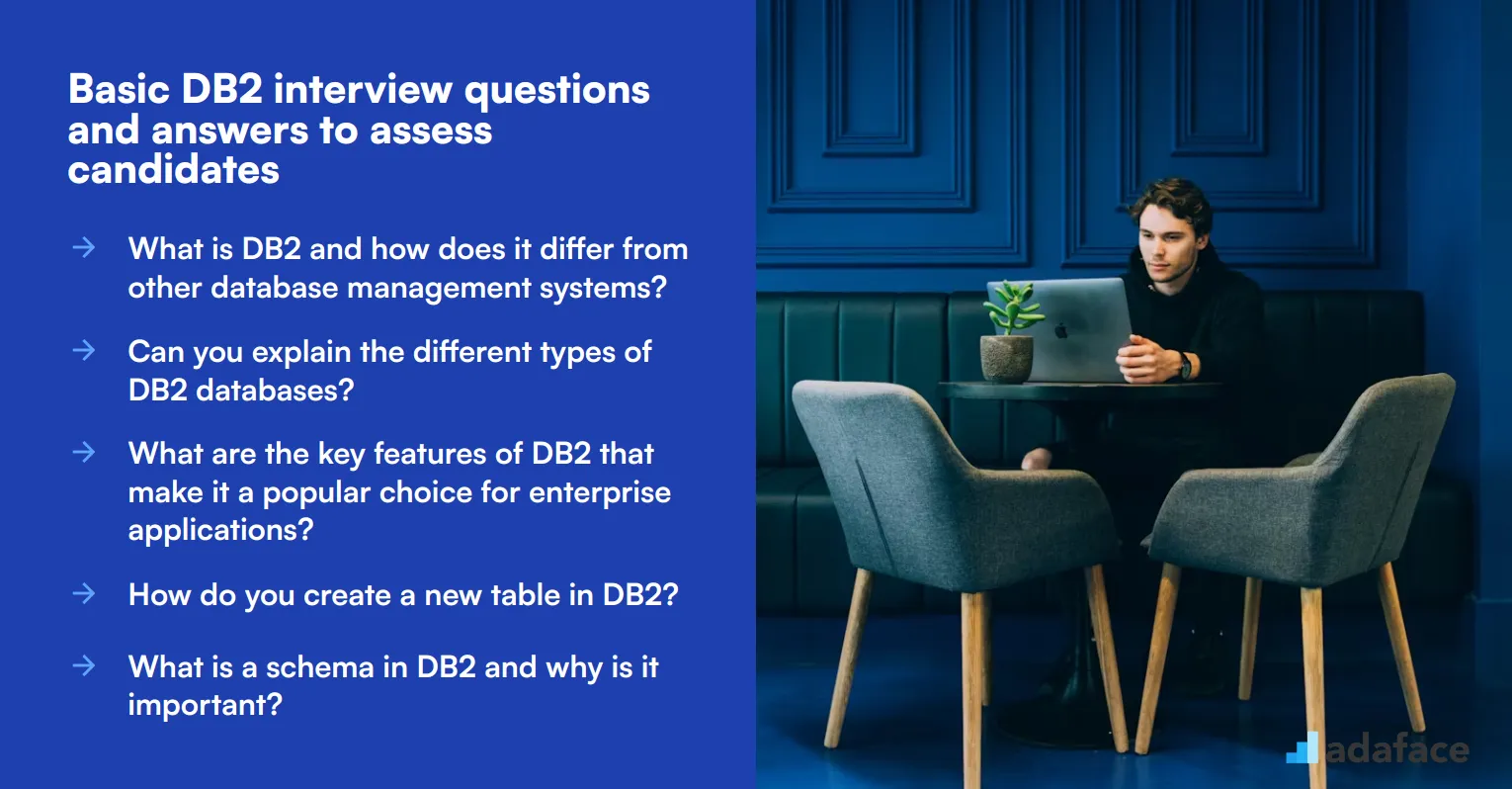
To effectively evaluate candidates' foundational knowledge of DB2, consider incorporating these basic interview questions into your hiring process. This list can help you identify applicants who possess the essential skills needed for roles such as a database administrator.
- What is DB2 and how does it differ from other database management systems?
- Can you explain the different types of DB2 databases?
- What are the key features of DB2 that make it a popular choice for enterprise applications?
- How do you create a new table in DB2?
- What is a schema in DB2 and why is it important?
- How can you retrieve data from a DB2 table using SQL?
- What is the purpose of indexes in DB2 and how do they improve performance?
- Can you describe the process of backing up and restoring a DB2 database?
- What are stored procedures in DB2 and how do they benefit database operations?
- How do you manage user permissions and roles in DB2?
- What is the significance of normalization in DB2 database design?
- Can you explain what a DB2 cursor is and how it is used?
- What tools or techniques do you use for performance tuning in DB2?
- How do you handle errors in DB2 SQL statements?
- What is the difference between a primary key and a foreign key in DB2?
- Can you explain what data partitioning means in the context of DB2?
8 DB2 interview questions and answers to evaluate junior analysts
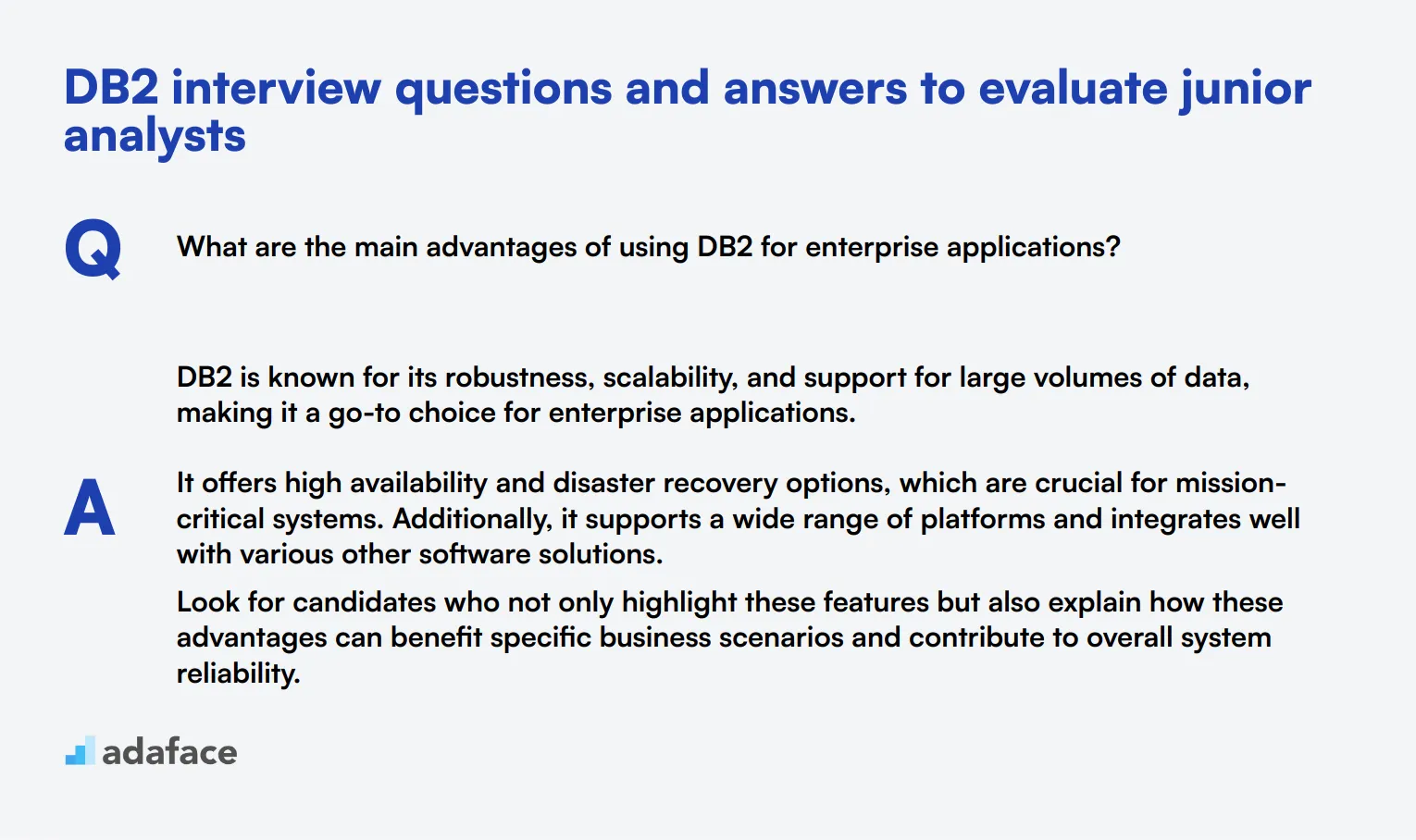
To determine whether your junior analyst candidates have a basic grasp of DB2 and its functionalities, use these essential DB2 interview questions. They are designed to assess both their theoretical understanding and practical skills, ensuring you find the right fit for your team.
1. What are the main advantages of using DB2 for enterprise applications?
DB2 is known for its robustness, scalability, and support for large volumes of data, making it a go-to choice for enterprise applications.
It offers high availability and disaster recovery options, which are crucial for mission-critical systems. Additionally, it supports a wide range of platforms and integrates well with various other software solutions.
Look for candidates who not only highlight these features but also explain how these advantages can benefit specific business scenarios and contribute to overall system reliability.
2. Can you describe the importance of buffer pools in DB2?
Buffer pools in DB2 are used to cache data pages in memory, which reduces the need for disk I/O operations and thereby improves performance.
They play a critical role in enhancing the efficiency of query processing by keeping frequently accessed data readily available in memory.
An ideal candidate should be able to explain the concept clearly and discuss how proper buffer pool management can lead to optimized system performance.
3. How do you ensure data integrity in DB2?
Ensuring data integrity in DB2 involves using constraints such as primary keys, foreign keys, and unique constraints to enforce data rules.
Additionally, employing transaction control mechanisms like COMMIT and ROLLBACK can help maintain data consistency and integrity during database operations.
Look for responses that demonstrate a solid understanding of these concepts and showcase practical examples of how they have implemented data integrity measures in past projects.
4. What strategies do you use for DB2 database performance tuning?
Performance tuning in DB2 often involves monitoring and optimizing SQL queries, adjusting buffer pool sizes, and indexing strategies.
Regularly analyzing query performance using tools like the DB2 Explain utility and making necessary adjustments can significantly enhance database efficiency.
Candidates should mention specific techniques they've used and their impact, providing a clear indication of their hands-on experience with DB2 performance tuning.
5. How do you handle database locking issues in DB2?
Database locking issues in DB2 can be managed by understanding and implementing proper isolation levels and lock timeouts.
Using techniques like lock escalation and deadlock detection mechanisms can help mitigate locking problems and ensure smooth transactional operations.
Candidates should be able to discuss real-world scenarios where they identified and resolved locking issues, showcasing their problem-solving skills in a database environment.
6. What are some common security measures you can implement in DB2?
Common security measures in DB2 include employing authentication and authorization mechanisms, encrypting sensitive data, and using roles and privileges to control access.
Regularly updating and patching the DB2 software also helps protect against vulnerabilities and security threats.
Strong candidates will discuss specific security practices they have implemented and how these measures have contributed to maintaining a secure database environment.
7. Can you explain the concept of a database partitioning in DB2 and its benefits?
Database partitioning in DB2 involves dividing a large database into smaller, more manageable pieces called partitions, which can be stored across multiple servers.
This approach can significantly improve performance, manageability, and availability by distributing data and workload more efficiently.
Look for candidates who can articulate the benefits of partitioning and provide examples of when and how they have used this technique to optimize database systems.
8. How do you perform database migration in DB2?
Database migration in DB2 typically involves exporting data from the source database, transforming it as needed, and importing it into the target database.
Using tools like DB2 Move, DB2 Load, and DB2 Look can facilitate the migration process, ensuring data integrity and consistency.
Candidates should describe their experience with these tools and any challenges they faced during migrations, highlighting their ability to manage complex DB2 environments.
18 intermediate DB2 interview questions and answers to ask mid-tier analysts
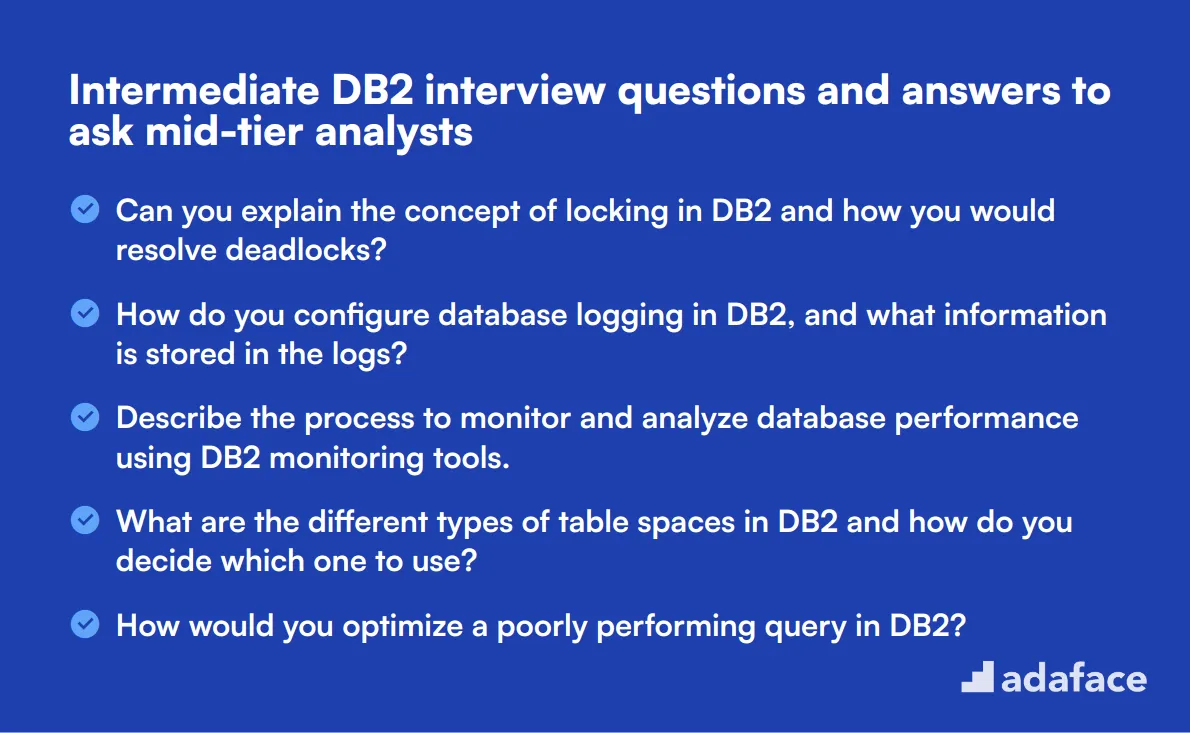
To assess whether your mid-tier analysts have the necessary skills and knowledge to effectively manage and optimize DB2 databases, consider asking them these 18 intermediate DB2 interview questions. This list will help you identify candidates who are well-versed in advanced DB2 concepts and can handle more complex tasks. For more detailed role descriptions, you might refer to this database administrator job description.
- Can you explain the concept of locking in DB2 and how you would resolve deadlocks?
- How do you configure database logging in DB2, and what information is stored in the logs?
- Describe the process to monitor and analyze database performance using DB2 monitoring tools.
- What are the different types of table spaces in DB2 and how do you decide which one to use?
- How would you optimize a poorly performing query in DB2?
- Can you explain the use of triggers in DB2 and provide an example of how you've used them?
- What steps would you take to upgrade a DB2 database from one version to another?
- How do you approach database design to ensure scalability and performance in DB2?
- Describe a situation where you had to troubleshoot a complex issue in a DB2 environment. How did you resolve it?
- How do you implement and manage data encryption in DB2?
- Explain the concept of High Availability Disaster Recovery (HADR) in DB2 and its benefits.
- How do you perform data replication in DB2, and what are the key considerations?
- What are the best practices for managing large volumes of data in a DB2 database?
- How do you ensure compliance with data security and privacy regulations in DB2?
- Can you describe the process of migrating a DB2 database to a different platform or environment?
- What is a materialized query table (MQT) in DB2 and how does it improve query performance?
- How do you handle schema changes in a production DB2 database without causing downtime?
- Describe the process of setting up and using database partitioning in DB2 to improve performance and manageability.
7 advanced DB2 interview questions and answers to evaluate senior administrators
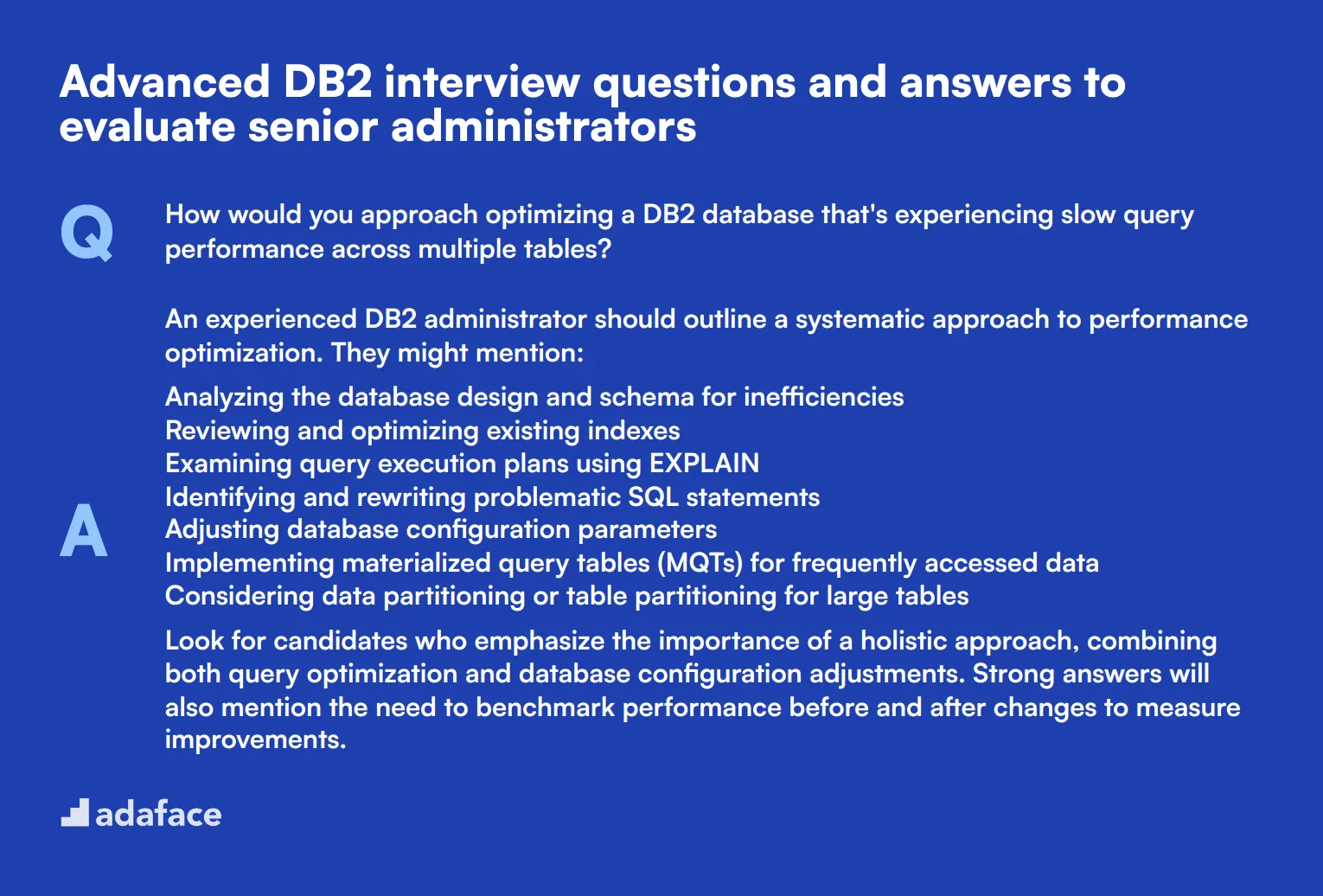
Ready to separate the DB2 wizards from the wannabes? These 7 advanced DB2 interview questions will help you evaluate senior administrators and uncover their deep expertise. Use this list to assess candidates' problem-solving skills, database optimization knowledge, and real-world experience with complex DB2 environments. Remember, the devil's in the details, so listen carefully to their responses!
1. How would you approach optimizing a DB2 database that's experiencing slow query performance across multiple tables?
An experienced DB2 administrator should outline a systematic approach to performance optimization. They might mention:
- Analyzing the database design and schema for inefficiencies
- Reviewing and optimizing existing indexes
- Examining query execution plans using EXPLAIN
- Identifying and rewriting problematic SQL statements
- Adjusting database configuration parameters
- Implementing materialized query tables (MQTs) for frequently accessed data
- Considering data partitioning or table partitioning for large tables
Look for candidates who emphasize the importance of a holistic approach, combining both query optimization and database configuration adjustments. Strong answers will also mention the need to benchmark performance before and after changes to measure improvements.
2. Can you explain the concept of autonomic computing in DB2 and how it impacts database administration?
Autonomic computing in DB2 refers to the database's ability to self-manage, self-heal, and self-tune without constant human intervention. It's designed to reduce the workload on database administrators and improve overall system performance and reliability.
Key features of autonomic computing in DB2 include:
- Automatic statistics collection
- Self-tuning memory management
- Automatic storage management
- Health monitoring and alerting
- Automatic maintenance (e.g., backups, reorganizations)
A strong candidate should be able to discuss how autonomic features can be leveraged to improve efficiency, but also emphasize the importance of understanding these features to intervene when necessary. Look for answers that balance the benefits of automation with the need for human oversight in critical situations.
3. Describe a situation where you had to implement a high availability solution for a DB2 database. What factors did you consider, and what approach did you take?
An experienced DB2 administrator should be able to discuss implementing high availability solutions like HADR (High Availability Disaster Recovery) or pureScale. They might describe:
- Assessing the business requirements for uptime and data loss tolerance
- Choosing between synchronous and asynchronous replication
- Setting up primary and standby databases
- Configuring network connectivity and firewall rules
- Implementing automatic client reroute
- Testing failover and failback procedures
- Monitoring replication lag and health status
Look for answers that demonstrate a thorough understanding of high availability concepts and DB2-specific features. Strong candidates will also mention considerations like network latency, storage requirements, and the impact on application performance. They should emphasize the importance of thorough testing and documentation of the HA setup.
4. How do you approach capacity planning for a growing DB2 database environment?
Effective capacity planning is crucial for maintaining performance as databases grow. A skilled DB2 administrator should outline a process that includes:
- Analyzing current resource utilization (CPU, memory, I/O, storage)
- Forecasting future growth based on historical trends and business projections
- Identifying potential bottlenecks in the current infrastructure
- Planning for scalability through techniques like data partitioning or table partitioning
- Considering the impact of new applications or increased user load
- Evaluating hardware upgrade options or cloud migration possibilities
- Implementing and monitoring resource alerts
Strong candidates will emphasize the importance of regular monitoring and proactive planning. They should also mention the need to balance performance requirements with cost considerations. Look for answers that demonstrate experience with DB2's built-in monitoring tools and an understanding of how different workload types impact resource needs.
5. What strategies would you employ to minimize downtime during a major DB2 version upgrade?
Upgrading DB2 while minimizing downtime requires careful planning and execution. An experienced administrator should discuss strategies such as:
- Thorough pre-upgrade testing in a staging environment
- Using DB2's online schema evolution to make compatible changes ahead of time
- Implementing a rolling upgrade strategy for multi-node environments
- Utilizing DB2's redirect restore feature to upgrade a copy of the database
- Preparing a detailed rollback plan in case of unexpected issues
- Scheduling the upgrade during low-traffic periods
- Automating as much of the upgrade process as possible to reduce human error
Look for candidates who emphasize the importance of preparation and risk mitigation. They should also mention post-upgrade tasks like verifying application compatibility and monitoring performance. Strong answers will demonstrate an understanding of DB2's specific upgrade features and best practices for enterprise environments.
6. How would you design a DB2 database to handle multi-tenant applications with varying workloads?
Designing a DB2 database for multi-tenant applications requires balancing isolation, resource allocation, and scalability. A proficient DB2 administrator might propose approaches such as:
- Using separate schemas or databases for each tenant
- Implementing row-level security for shared tables
- Utilizing table partitioning to separate tenant data physically
- Leveraging DB2 workload management to allocate resources fairly
- Designing a flexible schema that can accommodate tenant-specific customizations
- Implementing data compression to optimize storage usage
- Using materialized query tables (MQTs) for frequently accessed data
Look for answers that demonstrate an understanding of the trade-offs between different multi-tenant architectures. Strong candidates will discuss how to balance performance, security, and manageability. They should also mention considerations for data backup and recovery in a multi-tenant environment.
7. Can you explain how you would implement and manage data encryption in DB2 to comply with data privacy regulations?
Implementing data encryption in DB2 is crucial for protecting sensitive information and complying with regulations like GDPR or HIPAA. A knowledgeable DB2 administrator should discuss:
- Using DB2's native encryption features like column-level encryption
- Implementing Transparent Data Encryption (TDE) for data-at-rest protection
- Managing encryption keys securely, possibly using a Hardware Security Module (HSM)
- Configuring SSL/TLS for data-in-transit encryption
- Implementing role-based access control to limit exposure of encrypted data
- Regularly auditing and rotating encryption keys
- Considering the performance impact of encryption and optimizing where necessary
Look for candidates who demonstrate a comprehensive understanding of both DB2's encryption capabilities and general data security principles. Strong answers will also address the challenges of key management and the importance of balancing security with performance. Candidates should mention the need for regular security audits and staying updated with the latest encryption standards.
12 DB2 interview questions about database management
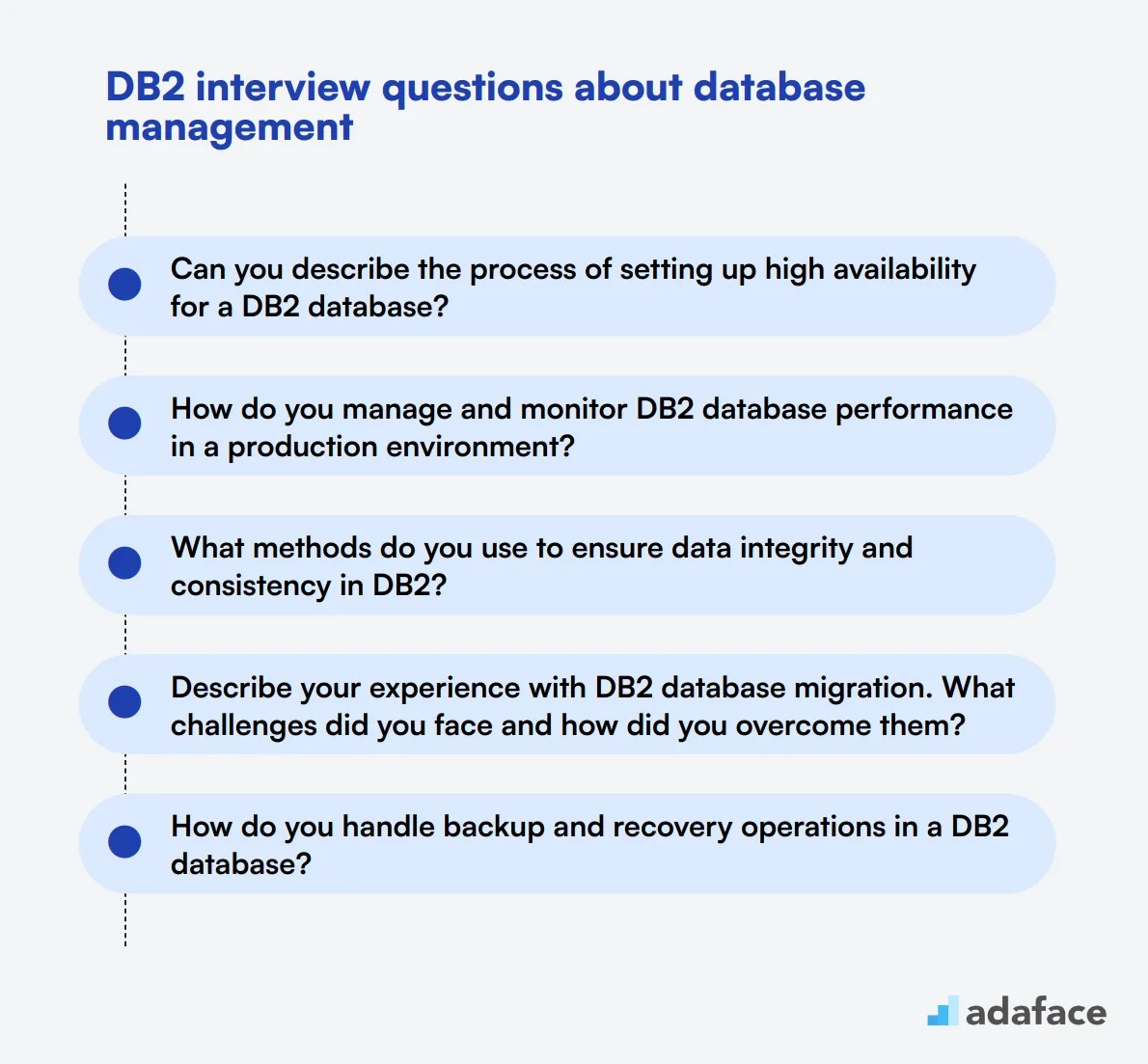
To ensure you hire the best candidates for your DB2 database management needs, use these targeted interview questions during your hiring process. They will help you assess technical expertise and practical experience, critical for roles like database administrator.
- Can you describe the process of setting up high availability for a DB2 database?
- How do you manage and monitor DB2 database performance in a production environment?
- What methods do you use to ensure data integrity and consistency in DB2?
- Describe your experience with DB2 database migration. What challenges did you face and how did you overcome them?
- How do you handle backup and recovery operations in a DB2 database?
- Explain how you would set up and manage a DB2 database in a cloud environment.
- What strategies do you use to optimize DB2 database queries for performance?
- Can you discuss your approach to managing DB2 database security?
- Describe how you would implement disaster recovery for a DB2 database.
- How do you handle schema changes in a DB2 database without causing downtime?
- What are your best practices for maintaining a DB2 database?
- Explain how you use DB2 monitoring tools to identify and resolve performance issues.
Which DB2 skills should you evaluate during the interview phase?
While it's impossible to evaluate every aspect of a candidate's DB2 expertise in a single interview, focusing on core skills can provide valuable insights. The following key areas are particularly important when assessing DB2 proficiency.
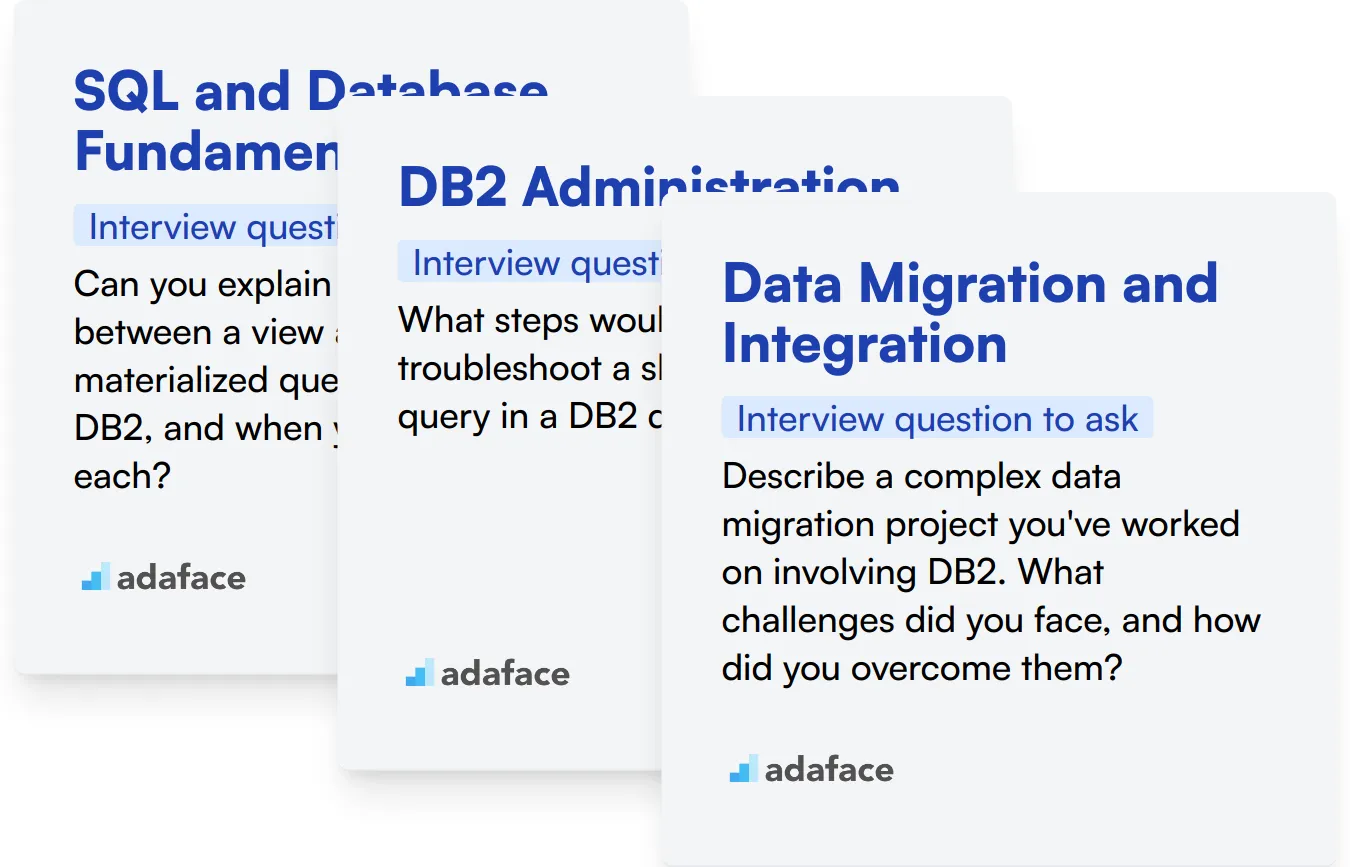
SQL and Database Fundamentals
A strong foundation in SQL and database concepts is essential for working with DB2. This includes understanding relational database principles, data modeling, and query optimization.
Consider using an SQL assessment test with relevant MCQs to evaluate candidates' knowledge of SQL and database fundamentals. This can help filter out candidates with a solid grasp of these core concepts.
During the interview, ask targeted questions to gauge the candidate's understanding of SQL and database principles as they relate to DB2. Here's an example question:
Can you explain the difference between a view and a materialized query table (MQT) in DB2, and when you would use each?
Look for answers that demonstrate an understanding of views as virtual tables and MQTs as physical tables. Candidates should be able to explain scenarios where each would be beneficial, such as using views for security or MQTs for query performance.
DB2 Administration
DB2 administration skills are crucial for maintaining and optimizing database performance. This includes knowledge of backup and recovery procedures, security management, and performance tuning.
You can use an IBM DB2 online test to assess candidates' knowledge of DB2 administration tasks. This can help identify candidates with practical experience in managing DB2 environments.
To evaluate DB2 administration skills during the interview, consider asking a question like:
What steps would you take to troubleshoot a slow-running query in a DB2 database?
Look for answers that mention checking the query execution plan, analyzing index usage, reviewing table statistics, and using DB2 monitoring tools. A good candidate should demonstrate a systematic approach to performance tuning.
Data Migration and Integration
Skills in data migration and integration are valuable for DB2 professionals. This includes experience with ETL processes, data replication, and working with heterogeneous database environments.
To assess a candidate's experience with data migration and integration, you might ask:
Describe a complex data migration project you've worked on involving DB2. What challenges did you face, and how did you overcome them?
Listen for answers that demonstrate practical experience in planning and executing data migrations. Candidates should be able to discuss strategies for handling large data volumes, ensuring data integrity, and minimizing downtime during the migration process.
Hire top DB2 talent with skills tests and targeted interview questions
When hiring someone with DB2 skills, it's important to accurately assess their abilities. This ensures you find candidates who can truly contribute to your team's database management needs.
The most effective way to evaluate DB2 proficiency is through skills tests. Our IBM DB2 online test provides a quick and accurate assessment of a candidate's DB2 knowledge and practical skills.
After using the DB2 test to shortlist top applicants, you can invite them for interviews. Use the DB2 interview questions outlined in this post to further evaluate their expertise and fit for your specific role.
Ready to streamline your DB2 hiring process? Sign up for Adaface to access our DB2 skills test and other database-related assessments. Our online assessment platform makes it easy to find the right DB2 talent for your team.
IBM DB2 Database Online Test
Download DB2 interview questions template in multiple formats
DB2 Interview Questions FAQs
DB2 is a database management system from IBM that provides a flexible and efficient database platform to manage structured and unstructured data.
Common questions include basic SQL queries, understanding of DB2 architecture, and simple database operations.
These questions can help identify a candidate's proficiency with DB2, their problem-solving abilities, and their experience with database management.
Critical skills include knowledge of DB2 architecture, performance tuning, backup and recovery, and security management.
A structured set of questions ensures a consistent and thorough evaluation of all candidates, helping to identify the best fit for the role.
Interviewers should ask about performance tuning, complex query optimization, and real-world problem-solving scenarios.

40 min skill tests.
No trick questions.
Accurate shortlisting.
We make it easy for you to find the best candidates in your pipeline with a 40 min skills test.
Try for freeRelated posts
Free resources




